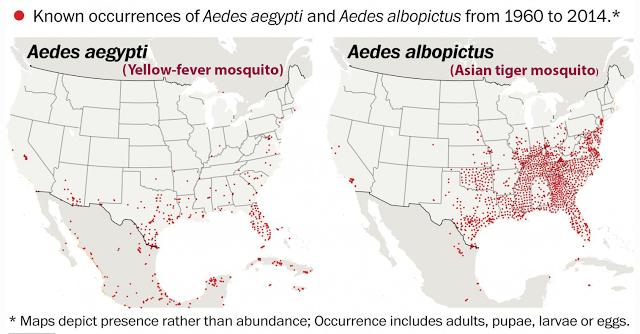Zika virus, which can cause small heads and brains in newborns, will get to Kentucky, but experts disagree on its likely impact

is far less certain, say public health and infectious disease experts,
is Zika’s potential reach and impact here. The South is seen as
especially vulnerable because of its warm, humid climate and pockets of
poverty where more people live without air conditioning or proper window
screens. Plus, the region is already home to mosquitoes that can
transmit the virus.”
The mosquito of main concern, the Asian tiger mosquito, has been reported many times in Kentucky; one of potential concern, the yellow-fever mosquito, has been reported in Indiana.
 |
| Washington Post graphic emendated by Kentucky Health News |
“Nearly three dozen cases have been
confirmed to date in 11 states and the District of Columbia,” but the federal Centers for Disease Control and Prevention “acknowledges that the number is growing rapidly,” the Post notes. “In each, the person was
believed to have been infected while out of the country.” The CDC has extended its travel warning northward to the Caribbean.
kinds of mosquitoes, are widespread in Latin America, but their foothold
in the United States has been controlled, with only small clusters of
cases.”
However, Peter Hotez, dean of the National School of
Tropical Medicine at Baylor University in Waco, Texas, told the Post, “I think we’re in for real trouble in the United States,” because Zika can spread quickly. “He focuses on conditions throughout the Gulf Coast, where
stagnant water sources — in uncollected garbage, discarded tires,
untended bird baths — can be ideal breeding grounds for mosquitoes much
of the year.”